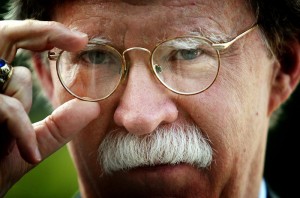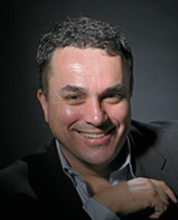
Former UN Ambassador John Bolton
Presented with the kind permission of C-SPAN and Hudson Institute
Former American Ambassador to the United Nations, John Bolton, speaks at the Hudson Institute’s Reclaim American Liberty Conferenxe about the Obama administration’s foreign policy and criticizes what he sees as President Obama’s preference for global governance.
Among the issues he addresses are approaches to global climate change policy, weapons proliferation, engagement with Iran and North Korea, and relations with Russia.
Erika Andersen, who attended this conference, blogs:
Bolton centered his remarks on the opinion that Obama aspires to a European elitist view of America and that the President does not “believe we live in a threatening world.”
“I don’t think the President really cares about foreign policy or national security,” said Bolton. “He’ll deal with it when he has to … (but) it’s more of a distraction than a priority, which is a remarkable development for an American president.”
Bolton touched on the government’s global warming concerns as well, saying efforts in this area have crowded national security concerns. He noted that some of America’s satellite national security cameras would soon be used to monitor global warming concerns.
“I never knew our satellite capabilities ever had any spare time,” Bolton deadpanned.
He criticized the Obama Administration’s 100% reliance on international negotiation to achieve peace, noting that “Iran and North Korea see no incentive to come to the table even after a year of near desperate attempts to get them there.”
Bolton speculated that America is one-fourth of the way through the Obama presidency and criticized the Administration’s actions to decrease American sovereignty by bowing to a system of global governance.
“We see sovereignty not as an abstract concept but as essence of government,” Bolton said. “When someone says the solution of global problems requires that you share sovereignty or give it up, that’s like saying you have too much control over your government and you need to give it a little away.”
Reporting from PowerlineBlog.com
John Bolton delivered the keynote address today in New York at the first annual Reclaim American Liberty Conference. The conference was presented by the Hudson Institute in partnership with the Family Security Foundation and Human Events.
Ambassador Bolton argued that several elements have combined to induce President Obama to enroll in the essentially European project of global governance. Among these elements are Obama’s underlying lack of interest in foreign policy and national security (to him, they are distractions), his sense that America is too powerful, and his desire to eschew old-fashioned patriotism in favor of a “post-American” presidency.
Although Obama is constrained by domestic political considerations from fully articulating his preference for ceding sovereignty in favor of global governance, Bolton finds clear evidence of that preference on several fronts. Obama’s approach to “climate change” is perhaps the clearest example. Climate change is the main issue through which the “global governance” crowd seeks to gain power.
Far from resisting this attack on our right of self-governance, Obama has sided with the Europeans. As Mark Steyn would point out later in the day, it took the Chinese to save us from ourselves at Copenhagan.
But there is some folly that even the Chinese can’t save us from. Bolton reported that U.S. intelligence satellites are now being used in part to monitor “climate change.” He added that when he was in government, these assets were in extremely high demand just to serve their traditional purpose of figuring out what our enemies were up to.
Bolton also cited our approach to preventing the proliferation of weapons of mass destruction. With respect to North Korea and Iran, we have deferred to the “global community” and now rely on a policy of begging these countries to negotiate with us. Although negotiating is a good tactic for a nation like Iran that still needs time to develop nuclear weapons, Iran has resisted because it knows there will be no adverse consequences. Thus, Iran does not even need to negotiate in order to avoid U.S. action. And by holding out, it can expect to receive additional inducements to come to the table, if it comes to that.
Ultimately, says Bolton, Iran and North Korea are understandably confident that they can “roll” Obama.
In the meantime, the rest of the world sees a weak U.S. And when we ultimately fail to stop either nation, the floodgates of nuclear proliferation will open.
Bolton argues, as we have almost since we started blogging, that the only way to stop Iran from developing nuclear weapons is to attack its nuclear facilities. For Obama such an attack is out of the question, so that leaves Israel. Bolton did not predict whether Israel will attack Iran, but he noted that it will be forced to make its decision soon.
Bolton holds out some hope that the opposition movement in Iran will succeed. And he bemoans the fact that during the past decade, we did so little to help it. In recent years, power has flowed to the Revolutionary Guard, making an overthrow of the government more difficult in some ways.
In any event, Bolton questions whether a change in government, even to a democratic system, would cause Iran not to develop nukes. And he believes that, even with such a change, the Saudis and others in the region would feel the need to develop nukes.
Finally, Bolton predicts that President Obama will soon enter into an arms control agreement with Russia. The agreement will be one-sided, with the U.S. agreeing to a reduction in both weapons and delivery systems. This, in turn, will further undermine our ability to project power and be regarded as an additional sign of our weakness.
Treaties must be ratified by the Senate by a two-thirds vote. Bolton predicts a massive fight on this question. He notes, however, that even in the absence of a ratified treaty, a Democratic majority could, working with Obama, make unilateral cuts.
Obama may not be all that interested in foreign policy, but he still seems poised to make plenty of mischief in that domain.









